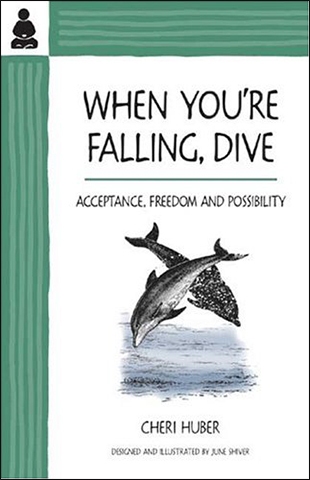" 'Whatever' is one of the great Zen responses of all time. Conditioning, or self-hate, begins its tirade: 'You should have . . . If only you had . . . It's all your fault because . . .' And your response is a yawn: 'Whatever.' Adults go crazy when kids say that to them, because the adults know they are absolutely powerless in the situation. It works the same way with our own conditioning: it's powerless when we offer no resistance. The acceptance of 'Whatever' frees us," writes Cheri Huber, founder of the Mountain View Zen Center in 1983 and the Zen Monastery Practice Center in 1987. She teaches in both California communities and has written 14 books on self-help and spirituality. Ms. Huber also hosts a radio program out of Palo Alto, California.
In this down-to-earth work, she explores the various ways our conditioning and our need for control makes resistance to what is in our lives our most consistent way of responding to challenges and setbacks. Her Buddhist perspective on acceptance comes across clearly with plenty of illustrative material. Here's her explanation of the book title:
" 'When you're falling, dive' means when you're resisting life, just allow it to be what it is, and the suffering will be over. To see how this works, we will undertake a self-examination, observing the effects of resistance in our lives, seeing how it keeps us stuck in our suffering. Then, through simple awareness, we can begin to free ourselves from the persistent dissatisfaction and the underlying fears that keep us from living a life of ease and joy."
Resistance plays an inordinately large role in our lives. It causes us a lot of unnecessary worry and pain and disappointment. For example, we listen to those conditioned voices of the ego which separate us from others and constantly put us on the defensive. Yearning for safety and no surprises, we put up barriers between ourselves and anybody who is different. Then in new situations, we go back to the old conditioned voices and hide out once again, refusing to reach out to others. These resistances etch themselves into our bodies, and we become tight and unyielding. Huber calls these voices of self-hatred. In a poignant phrase, she sums it all up: "When your life isn't working, it isn't working because you're believing things that aren't true and doing things that don't work."
Huber challenges us to see our resistances and to accept our conditioned thoughts and behaviors, i.e. to live in the present moment with awareness. Typical of Zen teachers, the author does not give us the chance to score brownie points with this insight: "Acceptance doesn't change anything, Awareness doesn't change anything. And we will never get anything out of being present. We can say 'thank you' when we get it that we don't want our little ego identity to think that it is enlightened." Or as Huber said in the beginning, "whatever."
